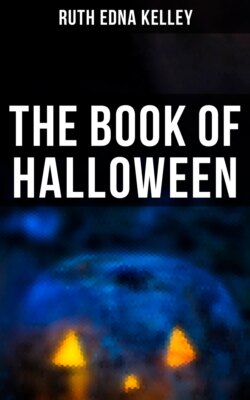Читать книгу The Book of Halloween - Ruth Edna Kelley - Страница 8
На сайте Литреса книга снята с продажи.
CHAPTER V
THE COMING OF CHRISTIANITY. ALL SAINTS'. ALL SOULS'
ОглавлениеTable of Contents
The great power which the Druids exercised over their people interfered with the Roman rule of Britain. Converts were being made at Rome. Augustus forbade Romans to became initiated, Tiberius banished the priestly clan and their adherents from Gaul, and Claudius utterly stamped out the belief there, and put to death a Roman knight for wearing the serpent's-egg badge to win a lawsuit. Forbidden to practise their rites in Britain, the Druids fled to the isle of Mona, near the coast of Wales. The Romans pursued them, and in 61 a. d. they were slaughtered and their oak groves cut down. During the next three centuries the cult was stifled to death, and the Christian religion substituted.
It was believed that at Christ's advent the pagan gods either died or were banished.
"The lonely mountains o'er
And the resounding shore
A voice of weeping heard, and loud lament.
From haunted spring and dale,
Edged with poplar pale,
The parting genius is with sighing sent.
With flower-inwoven tresses torn
The nymphs in twilight shade of tangled thickets mourn."
Milton: On the Morning of Christ's Nativity.
The Christian Fathers explained all oracles and omens by saying that there was something in them, but that they were the work of the evil one. The miraculous power they seemed to possess worked "black magic."
It was a long, hard effort to make men see that their gods had all the time been wrong, and harder still to root out the age-long growth of rite and symbol. But on the old religion might be grafted new names; Midsummer was dedicated to the birth of Saint John; Lugnasad became Lammas. The fires belonging to these times of year were retained, their old significance forgotten or reconsecrated. The rowan, or mountain ash, whose berries had been the food of the Tuatha, now exorcised those very beings. The trefoil signified the Trinity, and the cross no longer the rays of the sun on water, but the cross of Calvary. The fires which had been built to propitiate the god and consume his sacrifices to induce him to protect them were now lighted to protect the people from the same god, declared to be an evil mischief-maker. In time the autumn festival of the Druids became the vigil of All Hallows or All Saints' Day.
All Saints' was first suggested in the fourth century, when the Christians were no longer persecuted, in memory of all the saints, since there were too many for each to have a special day on the church calendar. A day in May was chosen by Pope Boniface IV in 610 for consecrating the Pantheon, the old Roman temple of all the gods, to the Virgin and all the saints and martyrs. Pope Gregory III dedicated a chapel in St. Peter's to the same, and that day was made compulsory in 835 by Pope Gregory IV, as All Saints'. The day was changed from May to November so that the crowds that thronged to Rome for the services might be fed from the harvest bounty. It is celebrated with a special service in the Greek and Roman churches and by Episcopalians.
In the tenth century St. Odilo, Bishop of Cluny, instituted a day of prayer and special masses for the souls of the dead. He had been told that a hermit dwelling near a cave
"heard the voices and howlings of devils, which complained strongly because that the souls of them that were dead were taken away from their hands by alms and by prayers."
De Voragine: Golden Legend.
This day became All Souls', and was set for November 2d.
It is very appropriate that the Celtic festival when the spirits of the dead and the supernatural powers held a carnival of triumph over the god of light, should be followed by All Saints' and All Souls'. The church holy-days were celebrated by bonfires to light souls through Purgatory to Paradise, as they had lighted the sun to his death on Samhain. On both occasions there were prayers: the pagan petitions to the lord of death for a pleasant dwelling-place for the souls of departed friends; and the Christian for their speedy deliverance from torture. They have in common the celebrating of death: the one, of the sun; the other, of mortals: of harvest: the one, of crops; the other, of sacred memories. They are kept by revelry and joy: first, to cheer men and make them forget the malign influences abroad; second, because as the saints in heaven rejoice over one repentant sinner, we should rejoice over those who, after struggles and sufferings past, have entered into everlasting glory.
"Mother, my Mother, Mother-Country,
Yet were the fields in bud.
And the harvest—when shall it rise again
Up through the fire and flood?
* * * * *
"Mother, my Mother, Mother-Country,
Was it not all to save
Harvest of bread?—Harvest of men?
And the bright years, wave on wave?
"Search not, search not, my way-worn; Search neither weald nor wave. One is their heavy reaping-time To the earth, that is one wide grave."
Marks: All Souls' Eve.
